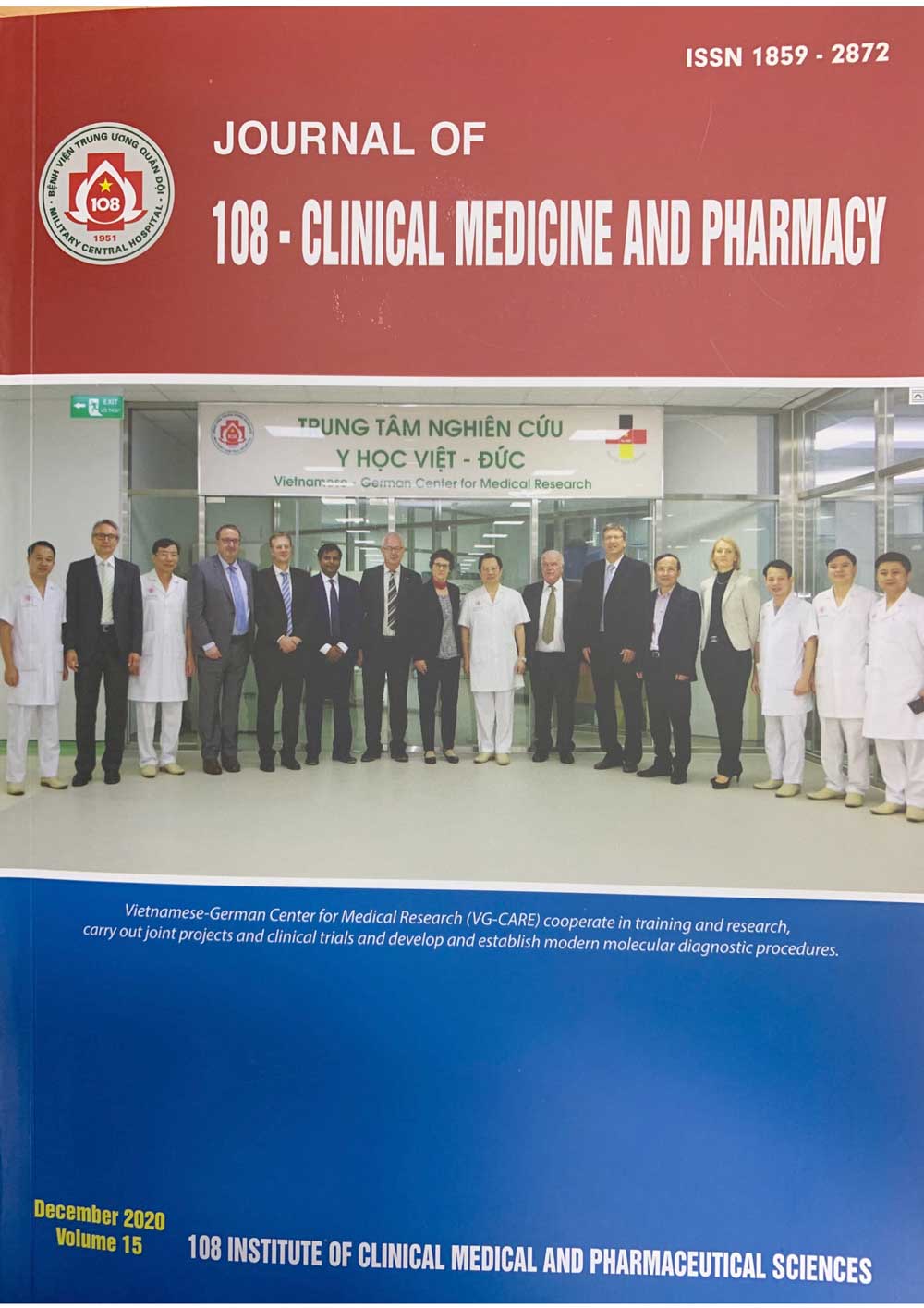Association of PD-1.9 polymorphism with the risk of HBV-related hepatocellular carcinoma
Main Article Content
Keywords
Tóm tắt
Objective: This case-control study aimed to determine the association between PD-1.9 polymorphism and the risk of HCC in the cohort of chronic HBV-infected patients. Subject and method: Genotyping of PD-1.9 polymorphism was performed by direct sanger sequencing in 499 HBV-infected patients. Patients were assigned into two groups, including CHB (n = 193) and HCC (n=306) based on clinical manifestations. Binary logistic regression adjusted for age and gender was performed to analyze the association of PD-1.9 variant with liver disease progression applying for different genetic models. Result: The frequencies of genotype PD-1.9 TT and minor allele T were significantly higher in HCC patients compared to CHB patients; genotype PD-1.9 TT: co-dominant model, OR = 2.1 (1.01-4.3), padj=0.047 and recessive model, OR = 1.8 (1.1-3.6), padj=0.042; allele PD-1.9 T: OR = 1.3 (1.1-1.8), padj=0.029. In addition, AFP levels were significantly higher in patients with genotype PD-1.9 TT compared to CT/CC genotype. Conclusion: This study, for the first time, reveals the association between PD-1.9 variant and the risk of HCC development in chronic HBV infection.
Article Details
Các tài liệu tham khảo
2. Shuai Z, Leung MW, He X, Zhang W, Yang G, Leung PS (2016) Eric GM: Adaptive immunity in the liver. Cell MolImmunol 13(3): 354-368.
3. Chang JJ, Lewin SR (2007) Immunopathogenesis of hepatitis B virus infection. ImmunolCell Biol 85(1): 16-23.
4. Peng G, Li S, Wu W, Tan X, Chen Y, Chen Z (2008) PD-1 upregulation is associated with HBV-specific T cell dysfunction in chronic hepatitis B patients. Mol Immunol 45(4): 963-970.
5. Zhang G, Liu Z, Duan S, Han Q, Li Z, Lv Y, Chen J, Lou S, Li N (2010) Association of polymorphisms of programmed cell death-1 gene with chronic hepatitis B virus infection. Hum Immunol 71(12): 1209-1213.
6. Huang C, Ge T, Xia C, Zhu W, Xu L, Wang Y, Wu F, Liu F, Zheng M, Chen Z (2019) Association of rs10204525 genotype GG and rs2227982 CC combination in programmed cell death 1 with hepatitis B virus infection risk. Medicine (Baltimore) 98(35): 16972.
7. Hou Z, Zhou Q, Lu M, Tan D, Xu X (2017) A Programmed Cell Death-1 haplotype is associated with clearance of Hepatitis B virus. Ann Clin Lab Sci 47(3): 334-343.
8. Zhang J, Zhao T, Xu C, Huang J, Yu H (2016) The association between polymorphisms in the PDCD1 gene and the risk of cancer: A PRISMA-compliant meta-analysis. Medicine (Baltimore) 95(40): 4423.
9. Dong W, Gong M, Shi Z, Xiao J, Zhang J, Peng J: Programmed Cell Death-1 Polymorphisms Decrease the Cancer Risk (2016) A meta-analysis involving twelve case-control studies. PLoS One 11(3): 0152448.
10. Hashemi M, Karami S, Sarabandi S, Moazeni-Roodi A, Malecki A, Ghavami S, Wiechec E (2019) Association between PD-1 and PD-L1 polymorphisms and the risk of cancer: A meta-analysis of case-control studies. Cancers (Basel) 11(8): 1150.
11. Isogawa M, Chung J, Murata Y, Kakimi K, Chisari FV (2013) CD40 activation rescues antiviral CD8(+) T cells from PD-1-mediated exhaustion. PLoS Pathog 9(7): 1003490.
12. Cheng HY, Kang PJ, Chuang YH, Wang YH, Jan MC, Wu CF, Lin CL, Liu CJ, Liaw YF, Lin SM et al (2014) Circulating programmed death-1 as a marker for sustained high hepatitis B viral load and risk of hepatocellular carcinoma. PLoS One 9(11): 95870.
 ISSN: 1859 - 2872
ISSN: 1859 - 2872
